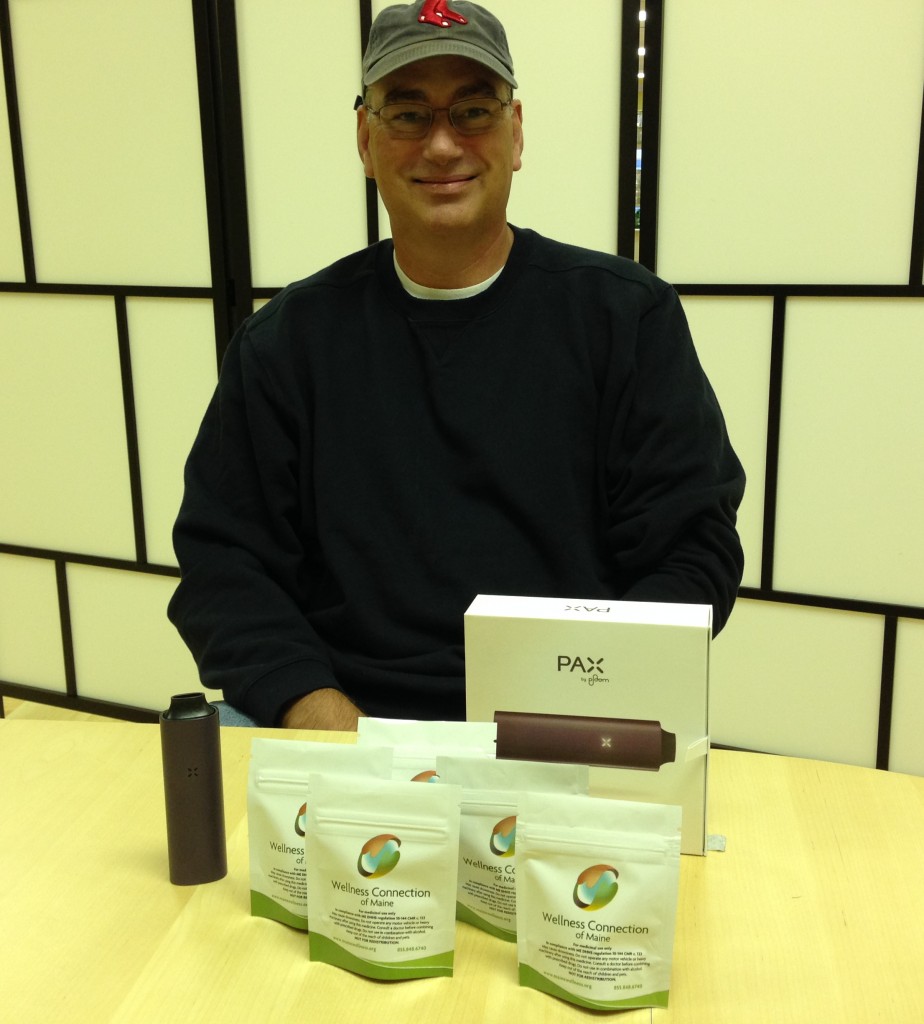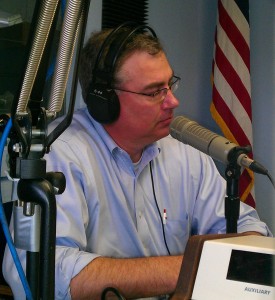In November 2013, Mark Bushey was diagnosed with ALS, the horrible disease that prompted so many of us to do the ice bucket challenge to help raise money for ALS research. To help him cope with various ALS symptoms, Mark recently started using medical marijuana.
When Mark agreed to share his story on the Catching Health blog we decided to meet at the medical marijuana dispensary that fills his prescription, operated by Wellness Connection of Maine. I’m not sure what I was expecting, but I can tell you he took me by surprise because he was a middle aged (he’s 51), conservatively dressed, fairly average seeming guy wearing a Boston Red Sox cap.
On the table in front of him were several small bags, each containing a different strain of medical marijuana. Some strains are better at treating anxiety or sleeplessness, others at relieving pain, stimulating appetite or alleviating other symptoms. Because one of his symptoms is difficulty breathing, Mark doesn’t smoke his cannabis. Instead, he uses a small vaporizer.
For those of you in Maine who know a Mark Bushey from the WLOB radio program Mind Your Own Business with Debi Davis, it’s the same Mark Bushey. Only now, his speech is garbled because of ALS and it’s sometimes difficult to understand what he’s saying. That’s only one of his symptoms. There’s also the breathing difficulty, increasing weakness and pain, drooling and, as you might guess, anxiety and depression, sometimes deep depression.
Mark’s diagnosis
Mark was diagnosed after a year of testing to rule out other diseases, including multiple sclerosis and Lyme disease. ALS usually starts in the hands and arms or feet and legs and then spreads to other parts of the body, but his first symptoms were trouble with speech and breathing.
Early signs and symptoms of ALS
- Difficulty walking, tripping or difficulty doing your normal daily activities
- Weakness in your legs, feet or ankles
- Hand weakness or clumsiness
- Slurring of speech or trouble swallowing
- Muscle cramps and twitching in your arms, shoulders and tongue
- Difficulty holding your head up or keeping a good posture
ALS stands for Amyotrophic lateral sclerosis. The disease damages nerves cells in the brain and spinal cord that control how our muscles move. Nerve cells in the brain send messages to the spinal cord and nerve cells in the spinal cord send messages to the muscles. Together, they make up the body’s neuromuscular system, which controls all the movements most of us take for granted — breathing, walking, hugging someone we love, holding a glass, a fork, a hairbrush, working on the computer like I’m doing right now as I write Mark’s story.
When you have ALS, over time the nerve cells in the brain and spinal cord shrink and disappear and the muscles don’t get signals to move anymore. They get weaker and weaker and eventually stop working altogether, affecting the person’s ability to swallow, speak and even breathe.
When he got the diagnosis, Mark’s doctor told him he had less than two years to live. He did his research. He knew what to expect. He’d also been a rep for a pharmaceutical company for many years and knew there were no medications that would cure him or even make his symptoms go away or at least ease them a little.
He tried some off label drugs that were very expensive. Did they work I asked him. His answer: “It’s hard to say.” He said no to an ALS medication called Rilutek because, “All it does is maybe extend your life to three months. It also burns up your liver. So I said no.”
The decision to try medical marijuana
One of Mark’s healthcare providers brought up medical marijuana, suggesting that it might help relieve some of his symptoms. “I grew up during Reefer Madness,” he told me. “Marijuana was supposed to make you go insane. I was also from the pharmaceutical industry where it’s been a taboo subject. Once I got over the stigma and did my own research, I discovered it could do me a lot of good.”
He gave medical marijuana a try and says his breathing has improved, he can sleep, it makes his mouth dry, so he doesn’t drool as much, he has less pain and a better appetite.
Mark’s specialty as a pharmaceutical rep was pain medications — heavy duty pain medications. He is well-versed in their risks — addiction, overdose, serious side effects. “The marijuana doesn’t have side effects,” he says, “and it also doesn’t interact with anything. And, it really makes me feel good.”
He decided to tell his story because he hopes it will help people in situations like his get away from the stigma often associated with marijuana use. “Maybe they feel self-conscious about the high part or their doctors may be afraid to bring up the subject of medical marijuana. It has helped make my life better in a difficult situation. I hope it can help someone else.”



Leave A Comment